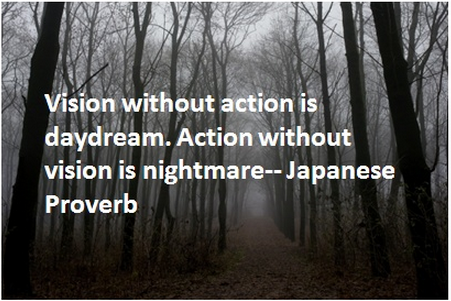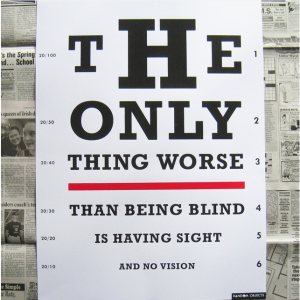Why does your vision matter?
Back during my days at the university, I spent a lot of time studying about leadership. What are key components of being a good leader? This is something we pondered and debated in class regularly. One overarching characteristic we always arrived at was a leader must have an inspiring vision. Sure, that makes perfect sense, I thought to myself. I understood it on a theoretical level, but at that time, I hadn't had the chance to experience it in a practical sense.
Setting the Bar
Over the years, I've worked at a several companies and have had the opportunity to see this realized in a practical sense. I have been lucky enough to experience great leadership early on in my career which set the bar for every company afterwards. This leader was able to inspire us all towards our common goals. He also instilled a sense of excellence in each of us. We learned nothing less than our best was acceptable. Not only did he continually inspire us to reach toward these goals, we were filled with excitement and passion on the journey.
Moving On
As time went on, the inevitable job changes occurred. With this came a few different companies each with strengths and weaknesses and more opportunity for me to listen and learn - and sharpen my own skills. I spent some time in companies where the leadership was not so strong. Working in a place with no vision or, worse yet, a place where the leadership team itself had a misguided understanding of their own purported vision, the value of a vision began to sink in on the practical level.
The Not So Great
The most detrimental atmosphere I found myself in was when the leadership itself proclaimed an inspiring vision but failed to back it up. There is no worse tragedy than having a great group of talented people become frustrated and disheartened by being told one thing by the leadership team yet held to different and unspoken expectations. When the vision is one thing, but the reality is something far different, it becomes a recipe for disaster. Working towards one goal only to be told you aren't doing what you are supposed to be doing creates confusion and disillusionment. As I stood watching brilliant, capable, and dedicated people stifled, publicly admonished, and punished by the management, my own disillusionment grew.
The Lesson
I've taken good and bad things from every place I've been lucky enough to be a part of. My outlook on it is this: there is something to learn in every situation- it is simply a lesson to be learned. The flip side of seeing the not so good stuff is how much it can strengthen my own resolve to do better. All those debates from college still whisper in my head - and now, not only do I understand on a theoretical level, I get it on the practical level. A company will be made (or conversely broken) by the vision of the company.
Stopping to talk and listen can seem a waste of time. It’s easy to cut off debate too early, especially in this economically trying moment. Still, mustering the discipline and time to share strategies with your staff or talk directly with your clients is only half the fight. You still need to communicate effectively–and that means being your organization’s chief listening officer.
What a challenge that is! Are you your organization's chief listening officer?

